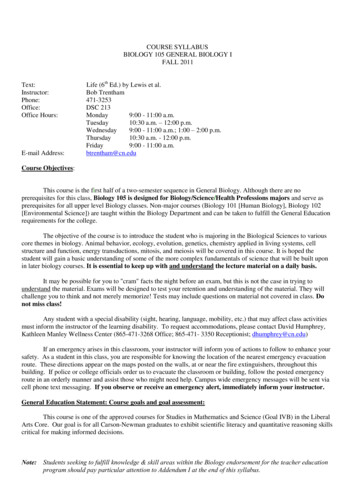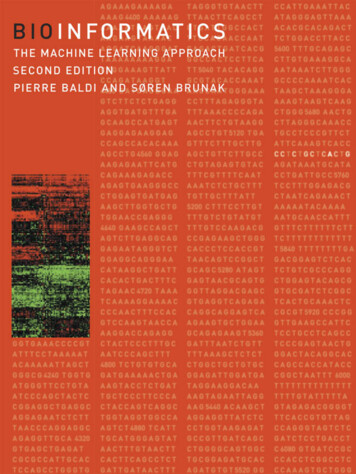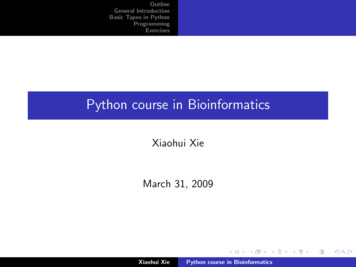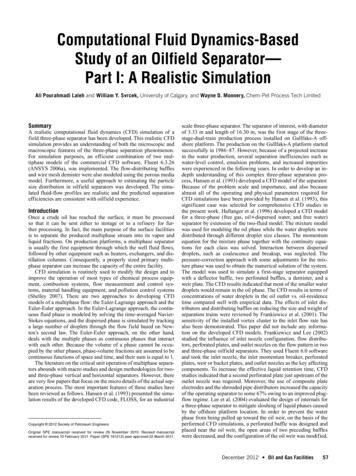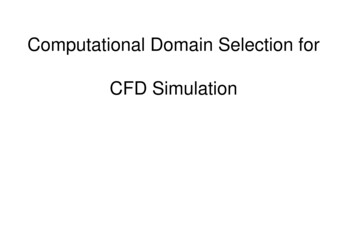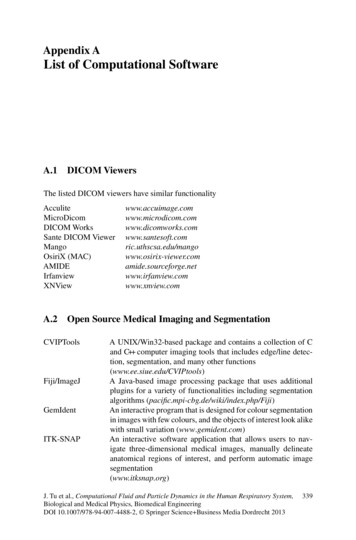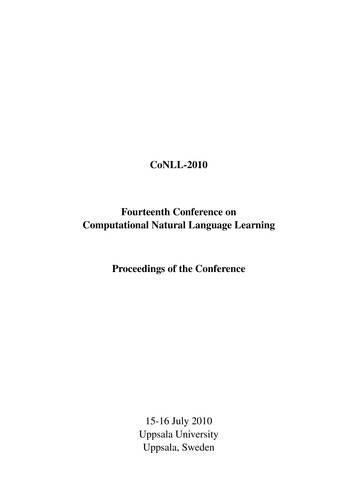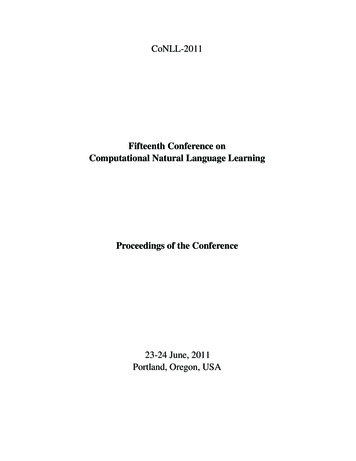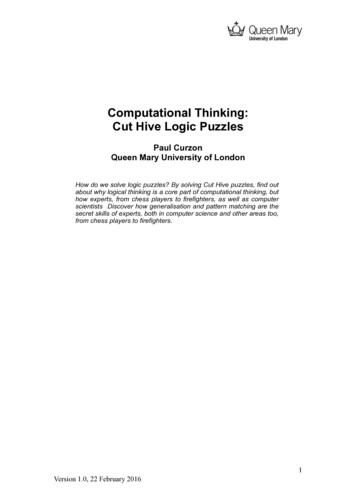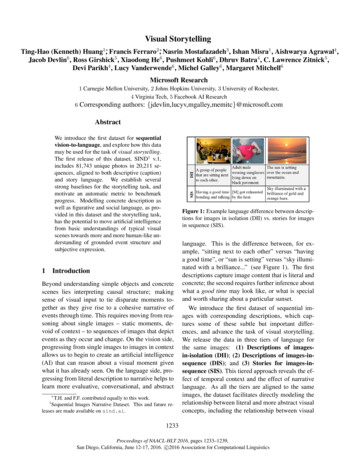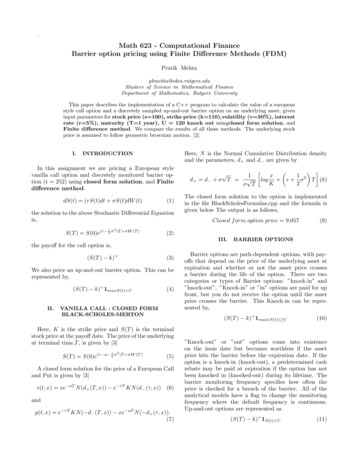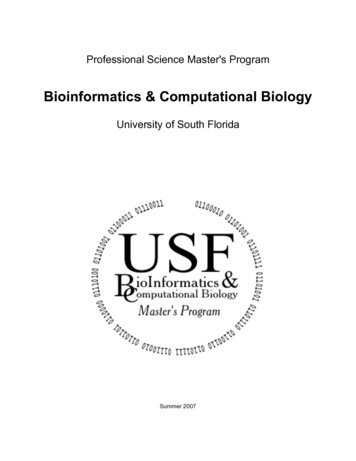
Transcription
Professional Science Master's ProgramBioinformatics & Computational BiologyUniversity of South FloridaSummer 2007
Program Directors:Dr. Michael Barbermbarber@hsc.usf.edu(813) 974-9702Fax: (813) 974-7357Dr. Inge Wefesiwefes@hsc.usf.edu(813) 974-5360Fax: (813) 974-7357http://molecularmedicine.health.usf.edu2
Master’s of ScienceInBioinformatics & Computational BiologyOVERVIEW:Program Development And Goal:The Masters Program in Bioinformatics and Computational Biology at the University ofSouth Florida represents a multi-college partnership and a truly interdisciplinarycollaboration. Participating departments include the Departments of Molecular Medicine(formerly Biochemistry & Molecular Biology) in the College of Medicine, Mathematics inthe College of Arts and Sciences, Computer Sciences and Engineering and the Divisionof Biomedical Engineering in the College of Engineering, Epidemiology & Biostatistics inthe College of Public Health and Information Systems & Decision Sciences in theCollege of Business Administration. The program is designed to meet the increasingdemand for trained people in this emerging area, which crosses the traditional fields ofbiological, mathematical and computer sciences. The program, therefore, builds on andcomplements the current strengths of the university.The Masters Program in Bioinformatics and Computational Biology was initiated and willbe administered by the Departments of Molecular Medicine in the College of Medicine.The program development has been supported by a grant from the Alfred P. SloanFoundation. At this time, only 13 institutions across the nation have won the highlycompetitive Sloan Awards to develop intensive two-year professional Master's degreeprograms in the rapidly growing field of bioinformatics and computational biology.The goal of the Masters Program in Bioinformatics & Computational Biology is toprovide students enrolled in the program with high quality training and education thatwill prepare them for careers in science, industry, health care and education. Thecurriculum has been designed accordingly and provides the theoretical background, thepractical training and, with the internships, the “real life” experience, which will equipstudents with the essential tools for a successful career in the field of Bioinformatics &Computational Biology.Program Description:The Masters Program in Bioinformatics & Computational Biology is designed for 42credit hours to be obtained during two years of study. Nine core courses will provide thefoundation and basics before advanced work, including four electives, and a Master’sthesis or internship will be pursued. The curriculum is flexible and will be tailored to theindividual student’s background, interests and career goals. However, electives mustbe selected from at least two of the participating departments to assure breadth oftraining.Exceptional students with extra motivation and commitment can enroll in the Ph.D.PLUS program. The Ph.D.-PLUS program provides the opportunity to study for a Ph.D.in Molecular Medicine and a Master’s degree in Bioinformatics and ComputationalBiologyconcurrently.Nine credit hours can be double 3
Master’s of ScienceInBioinformatics & Computational BiologyCURRICULUMPrerequisites:Calculus I-III, linear algebra, biostatistics, at least "C" and "maple"or "mathematica" or "math-cad", one year of general biology andone year of organic chemistry.YEAR 1Prematriculation:Semester:IIIFulfillment of prerequisite requirementsCourse #GMS 6200BCH 6888MAT 5932Course TitleCreditsBiochemistry and Molecular and Cellular Biology5Bioinformatics3Sel.Topics in Combinatorics and Graph Theory3BCH 6411GMS 6889MAT 5932Biomedical Genomics and GeneticsAdvanced BioinformaticsSelected Topics in Probability Theory433YEAR 2Semester:IIICourse #GMS 7930CIS 6930MAT 6932ElectiveCourse TitleCreditsResearch Ethics2Advanced Data Structures3Sel. Topics in Bioinformatics & Comp. Biology33IVElectiveElectiveBCH 6942 BCH 6943 Internship (140 contact hrs.)total334The tasks and experiences of the internship will have to be summarized in an InternshipReport. Before graduation, the student will provide a short (15 min) Power Pointpresentation of his/her internship experience to a small group of faculty.Graduate students must maintain an overall average of 3.0 (“B”) in all courses.4
ELECTIVE COURSESMolecular Medicine:BCH 6135BCH 6627BCH 6876GMS 7930BCH 6876BCH 6876Methods in Molecular BiologyMetabolic And Genetic Basis of Human DiseasesSelected Topics in Protein Structure/Function AnalysisProteomics and Structural BiologySpecial Topics in Molecular Modeling and Drug DesignSpecial Topics in Cell Signaling Pathways432322Management Information Systems:ISM 6124ISM 6218ISM 6225ISM 6930ISM 6930Advanced Systems Analysis and DesignAdvanced Database ManagementDistributed Information SystemsData Warehousing and Data MiningInformation Technology in Medical Care33333Computer Science and Engineering:COT 6405CEN 6016CAP 5625CAP 6638CAP 5400Introduction to the Theory of AlgorithmsSoftware EngineeringIntroduction to Artificial IntelligencePattern RecognitionDigital Image Processing33333Mathematics:STA 5326MAD 5305MAD 4504STA 5166MAT 6939Math StatisticsGraph TheoryTheory of ComputationComputational Statistics IGraduate Seminar33332Epidemiology & stics IICategorical Data AnalysisDesign of Experimental Studies for Health ResearchersBiostatistical Inference I3333Biomedical EngineeringESB CIS 6930Bioinformatics in Biomedical Engineering53
DESCRIPTIONS OF CORE COURSESGMS 6200 Biochemistry and Molecular and Cellular BiologyThe overall objective of this course is to provide students with a solid foundation ofbiochemical principles that underlie normal cellular and physiological processes.BCH 6888 BioinformaticsBioinformatics I is designed to introduce students to the diverse applications ofbioinformatics and computational biology software in probing both DNA and proteinstructure-function relationships. Students will develop familiarity with a broad range ofalgorithms designed to facilitate DNA sequence assembly and manipulation, proteinstructure analysis, motif identification, evolutionary alignments and structure prediction.Examples focus on major software applications that are routinely in Molecular Medicine.MAT 5932 Special Topics in Combinatorics and Graph TheoryThis course studies combinatorial and graph-theoretic techniques needed in dealingwith discrete objects.BCH 6411Biomedical Genomics and GeneticsThe course is designed to introduce students to multiple features of biomedicalgenomics and genetics such as genome composition and evolution, gene expression,genetic instability, mapping and identification of genes and susceptibility to Mendelianand complex diseases.Applications of genomics and genetics in therapeutictreatments including gene therapy, stem cell therapy and pharmacogenomics will alsobe discussed.GMS 6889 Advanced BioinformaticsAdvanced Bioinformatics is designed to provide an in depth analysis of DNA and proteinfunction using information derived from both current DNA and protein sequencedatabases. Advanced algorithms will be used to survey gene/protein functions andconstruct 3-dimensional protein models that will be used for rational ligand design.MAT 5932 Selected Topics in Probability TheoryThis course studies probability theory with an introduction to random processes.GMS 7930 Scientific Writing and EthicsThe objectives of the course are to involve the student in the complete writing of ascientific paper or grant proposal and to train the student in the area of scientific ethics.CIS 6930Advanced Data StructuresFundamentals and design of data organization for purposes of program efficiency,clarity and simplicity will be addressed. This course will be different from a traditional CScourse in that it would use bioinformatics related examples and assignments. It will alsobe a graduate level course that non-CS majors can take, without prior exposure to anundergraduate course. This course will be the crucial bridge into advanced graduatelevel CS courses for non-CS majors.MAT 6932 Special Topics in Bioinformatics and Computational BiologyThis course is intended to be a series of seminar type lectures covering mathematicaltechniques, models and theories in biological processes.6
DESCRIPTIONS OF ELECTIVE COURSESMolecular Medicine:BCH 6135 Methods in Molecular BiologyThis practicum teaches state of the art methods and techniques that are applied inMolecular Biology such as PCR, RT-PCR, Immunoprecipitation Western (Immuno-)Blotting, Gel Mobility Shift Assays, Northerns, Site-Directed Mutagensis, SequencingBCH 6627 Metabolic and Genetic Basis of Human Diseases“Metabolic and Genetic Basis of Human Diseases” will deal with the genetic, molecular,and biochemical basis of human diseases. The objectives of this course are: (i) toprovide a thorough understanding of the principles that underlie inheritance andexpression of genetic information; (ii) to present a wide variety of genetic diseases,based on their different modes of inheritance and the different nature of the geneproducts responsible. We will discuss autosomal dominant, autosomal recessive, Xlinked, and atypical patterns of inheritance. Several diseases will be discussed to serveas examples, including diseases related to metabolic pathways (anabolic, catabolic, andsalvage), trafficking, receptors, channels, and transporters.BCH 6876 Selected Topics in Protein Structure/Function AnalysisRecent advances in protein structure acquisition and analysis have provided newapproaches to understanding protein function. This course will focus on selected proteinstructural classes with the objective of understanding the role of specific structuralmotifs in regulating protein folding and architecture.GMS 7930 Proteomics and Structural BiologyProteomics and functional genomics are rapidly developing areas that impact on a widerange of disciplines. The course, "Proteomics and Functional Genomics", emphasizesthe interdisciplinary nature of proteomics and functional genomics and focuses onvarious aspects that will enable students to relate theoretical concepts and experimentalapproaches to a wide range of potential research problems. The course aims to providea solid foundation and breadth of understanding in proteomics and functional genomicsthat will facilitate application to current or future research problems. The initial sectionof the course provides a brief overview of the human genome project and proteomeinitiatives. The second section focuses on tools and technologies that have supportedadvances in proteomics and functional genomics. The third section is a series of majorsubtopics and applications of proteomics and functional genomics. The fourth sectionfocuses on various aspects of clinical proteomics and genomics, followed by a sectionof recent developments related to proteomics and functional genomics. The finalsection is devoted to student presentations on selected topics of particular interest toindividual students.BCH 6876 Selected Topics in Molecular Modeling and Drug DesignMolecular modeling can provide valuable insights into the role(s) of specific amino acidsresidues in protein structure and ligand interactions. This course will examine the use ofselected molecular modeling software suites to construct altered protein conformationsin response to mutational events and to develop structures the represent variousprotein-ligand and protein-protein interaction.7
BCH 6876 Selected Topics in Cell Signaling PathwaysThe interplay between intercellular and intracellular signaling constitutes the maininformation transfer mechanism underlying the development and function of multicellularorganisms. A malfunction in even a single step in this signaling network can lead tosever developmental disorders, psychiatric, neurodegenerative, vascular, and hormonaldiseases as well as many forms of cancer. The students will be introduced to manyparts of the complex network of interacting signaling systems with an emphasis ondevelopment, metabolism, the nervous system, cell cycle control and defects in thissystems.Mathematics:MAD 4504 Theory of ComputationThis course provides an overview of various aspects of computation theory, includinggrammars, languages and automata theory.STA 5326Math StatisticsThis course focuses on the mathematical underpinning of statistical techniques andmodels.MAD 5305 Graph TheoryGraph theory provides a basis for studying the relationships between discrete objects.This course will concentrate on various graph-theoretic properties.STA 5166Computational Statistics IStatistical anlysis of data by means of statistics package programs. regression, ANOVA,discriminant analysis and analysis of categorical data. Emphasis on inter-relationbetween statistical theory, numerical methods and analysis of real life data.Computer Science and Engineering:COT 6405 Introduction to the Theory of AlgorithmsAnalysis techniques for algorithms. Characterizing algorithms in terms of recurrencerelations, solution of recurrence relations, upper and lower bounds. Graph problems,parallel algorithms, Nondeterministic Polynomial time. Completeness and approximationalgorithms, with relationship to practical problems.CEN 6016 Software Engineering IBasic principles and formal methods for systematic development of software systems.Software life cycle, formal specifications, design, verification, and reliability analysis.CAP 5625 Introduction to Artificial IntelligenceBasic concepts, tools and techniques used to produce and study intelligent behavior.Organizing knowledge, exploiting constraints, searching spaces, understanding naturallanguage and problem solving strategiesCAP 6638 Pattern RecognitionSyntactic pattern recognition, Classification techniques, Performance characterization.8
CAP 5400 Digital Image ProcessingImage formation, sources of image degradation, image enhancement techniques, edgedetection operators and threshold selection, low-level processing algorithms for vision,image data compressionManagement Information Systems:ISM 6124Advanced Systems Analysis and DesignThis course covers advanced topics of information systems development. Studentslearn to manage and perform activities throughout the information systems developmentlife cycle. State-of-the-art system development processes, methods, and tools arepresented.ISM 6218Advanced Database AdministrationAdvanced database design and management. Review of Codd's rules for relationaldatabases. Database control issues. Object-oriented database analysis and design.Distributed database design and use of parallel systems. Expert and intelligentdatabases. OLAP databases.ISM 6225Distributed Information SystemsAnalysis, design, implementation, and management of distributed information systemsand networks.ISM 6930Data Warehousing and Data MiningThis course covers the rapidly emerging data warehouse and data mining technologiesthat are likely to play a strategic role in business organizations. Topics include thedifferences between operational and analytical database systems, dimensionalmodeling and star schemas, data warehouse performance issues, data quality, the datawarehouse development cycle, data warehouse navigation, and data miningtechniques. The Oracle database system will be used to illustrate many of the conceptscovered in class.ISM 6930Information Technology in Medical CareAn examination of the application of information technology in the contemporarymedical care industry from both an administrative and patient care perspective. Topicswill include medical care decision making, information systems planning, designing andimplementing information systems and the role of information technology in patient care.Epidemiology & Biostatistics:PHC 6051 Biostatistics IIIntermediate level biostatistical methods with a focus on analysis of variance, multipleregression, and analysis of covariance. Emphasis on residual diagnosis and modelbuilding with application to epidemiological and health studies.PHC 6053 Categorical Date AnalysisStudies of techniques used in analyzing data where subjects have been cross-classifiedby two or more categorical variables. Special emphasis given to problems frequentlyarising in epidemiology, public health and medicine.9
PHC 6054 Design of Experimental Studies for Health ResearchersThis course offers an interdisciplinary overview on the design and analysis of experimental orobservational studies in health related research. It focuses on the use of statistical principles andstrategies to ensure the validity, reliability, and efficiency of a design and corresponding dataanalysis.PHC 6057 Biostatistical Inference IThis course provides an overview of the theoretical foundation of biostatistical inferencewith an emphasis on applications to biological, medical, and health science research.Biomedical Engineering:ESB CIS 6930Bioinformatics in Biomedical EngineeringThe course discusses applications of bioinformatics and computational biology in areassuch as biomechanics, implant device development, biomaterials & cal imaging,biosensors & biomedicalinstrumentation, novel drug delivery, cardiovascular and biorheology technology andhealth management.10
FULFILLMENT OF PREREQUISITESPrerequisites:1. Calculus I-III,2. Linear algebra,3. Biostatistics,4. At least "C" and "maple" or "mathematica" or "math-cad",5. One year of general biology6. And one year of organic chemistry.Courses that have to be taken for fulfillment of pre-requirements of the Master’sProgram in Bioinformatics and Computational Biology do not have to be taken at theUniversity of South Florida. Some classes from the University of South Florida that willbe accepted for fulfillment of the entrance requirements are listed below:ESB CISESB CGSESB 102211201020113023224323111100310560506057C Unix/CIntro to VLSI CADOrganic Chemistry IOrganic Chemistry IIBiology I- Cellular ProcessesBiology II: Biological Diversity or Cell BiologyCell BiologyLife Sciences Calculus I-IIICalculus I-IIIConstructive Number Theory and Linear AlgebraLinear AlgebraBiostatistics IBiostatistical Inference IPlease note: Not all courses are offered in each semester. Some courses require extensive prerequisites. Please discuss with the individualcourse directors if some pre requirements can be waived due to prior training. For more information on individual courses check the following web sites:Oasis schedule of classes: h a bull: http://www.ugs.usf.edu/sab/sabs.cfm11
APPLICATION AND ADMISSIONIn order to be considered for admission, a first time graduate student or a studenttransferring from a graduate program at another university must fulfill the followingrequirements:General Admissions requirements:····A bachelor's degreeMust fulfill the prerequirements as stated in the curriculumA minimum undergraduate GPA of 3.0 on a 4.0 scaleA minimum combined GRE general test score of 1100 (verbal and quantitativeportions), not older than 5 years· Three letters of recommendation· Statement of purpose· Complete transcripts of undergraduate work and any previous graduate worko a transcript evaluation is needed for international students, tml· A completed online USF Application to Graduate StudiesThe general guidelines of the USF Graduate School Financial Aid:For inquiries about financial aid please wships and ellowships.aspUSF Career er fairs.htmApplication deadlines:Domestic Students FallSpringInternational
The Masters Program in Bioinformatics and Computational Biology at the University of South Florida represents a multi-college partnership and a truly interdisciplinary collaboration. Participating departments include the Departments of Molecular Medicine (formerly Biochemistry & Molecular Biology) in the College of Medicine, Mathematics in
